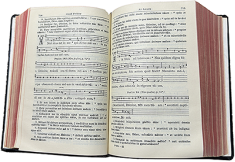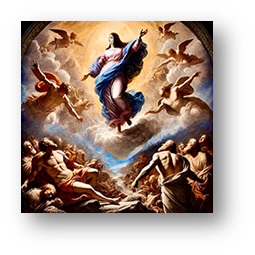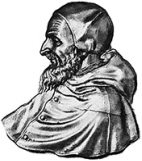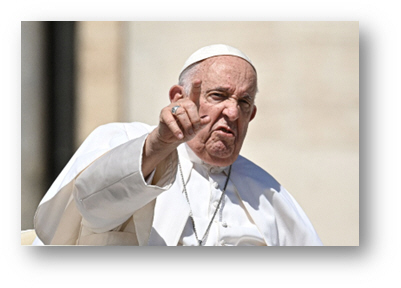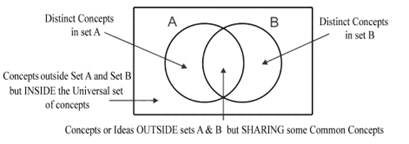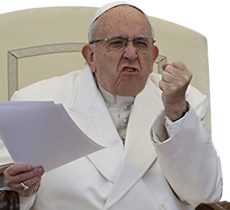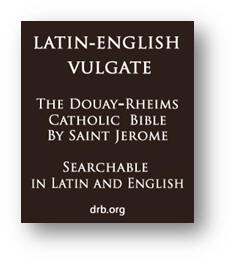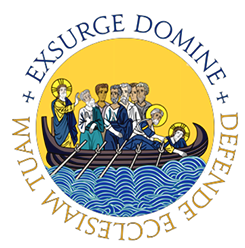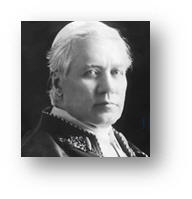Understand
this:
To love the pope is
to will him every good and no evil.
This is what it means for
a Catholic to love anyone.
We love Pope Francis in
this way; we will him every good and no evil.
Do we admire him?
Absolutely not! Do we esteem him. No! Is he dear to us? Not in
the least.
He is, canonically, our
pope — but few of us would predicate of him the two consecutive words
historically associated with the Vicar of Jesus Christ on Earth: “Holy
Father.” He has consistently demonstrated himself to be neither.
Holiness is not vindictive,
arrogant, despotic, and vengeful.
A Father does not abuse
his children, favoring some, punishing others, giving shelter to those
who please him while leaving those who do not please him out in the
cold, generously feeding his favored ones, while starving the ill-favored
in the hope that they will soon perish.
Such a man, whatever he
may be, is neither holy nor a father in any accepted understanding of
either word.
A holy man does
not do these things.
A father does not
do these things.
Ergo, a “Holy Father”
does not do these things.
But Francis does.
Consider his treatment
of virtually every Catholic, whether cleric, episcopal, or lay,
who adheres to the Traditional Latin Mass that has been loved and practiced
for the entire 2000-year history of the Church — until it was brutally
quashed by an edict from Francis in his motu proprio “Traditiones
Custodes” on 16 July 2021, callously depriving them of their most
cherished patrimony as Catholics in continuity with every Catholic for
the past … not 20 years, not even 200 years, but 2000 years!
… and with the simple stroke of a pen wielded by an authoritarian hand
that tolerates no opposition and crushes all dissent.
This is Francis (“the humble”)
who famously encourages all others to “walk in spiritual accompaniment”1
and “to listen to and hear one another” 2
— as long, apparently, as they walk, lockstep, with him
and agree with him in all matters spiritual, social, socio-sexual,
environmental, economic, and even political.
In living memory no other
pope has been so remorselessly, so openly punitive toward those he deems
to be impediments to his radically progressive agenda to remake the
Church in his own image, an image presciently sculpted in the background
by
Fazzini in the Modernist Pope Paul VI Audience Hall; an image of
things distorted and ultimately hideous.
Cross Francis and your
career is over, your position is lost, your vocation itself is in peril
and your very livelihood will likely be suspended; you will never be
granted an audience with him, no matter how high your ecclesiastical
rank (think
Cardinal Zen of China whom Francis has refused to see as he pursues
his own Ostpolitik with Communist China). Francis is nothing
if not vindictive. Were the Vatican a crime syndicate (it is not ….
is it?) Frankie would be a real “Capo” … less any pretensions
to refinement.
Consider this: bishops
have lost their dioceses. Joseph Strickland of Tyler, Texas is the most
notable to come to mind in America.
Priests by the scores have
been “cancelled” (too many to enumerate.
See Coalition for Canceled Priests) — they have had their faculties
for celebrating the Mass and the Sacraments revoked, and their means
for living removed.
One Cardinal and critic
of Francis (Raymond Burke) was punished twice: first, by being
removed by Francis as Prefect of the Supreme Tribunal of the Apostolic
Signatura, the court of final appeal at the Vatican: and then, not satisfied,
Francis then went on to take away his living quarters in Rome and still
not satisfied, stopped his stipend for living! I did say “Capo,”
yes? Un bell'uomo, sì? 3
So, what are we, as Catholics,
to make of Francis?
It is a question I struggle
with daily. There are, I think two categories that we are contending
with in addressing this question. Much like a Venn Diagram
4 there are areas where they overlap and
become particularly problematic, and I think that this is intentional
on the part of Francis as a means of obfuscating issues that would,
of themselves, be clearly distinguishable and susceptible to clear interpretation.
I believe that Francis
wishes to avoid precision because precision makes no allowance for ambiguity:
it redounds to unmistakable clarity which then calls for a necessary
resolution. It is particularly within that ill-defined penumbra on the
margins of issues where Francis feels that his arguments may
at least provisionally survive as minor or temporary premises, at least
long enough to carry forth what is essentially an enthymeme or sorites
to what he realizes is an an illegitimate conclusion. But it
is the conclusion, nevertheless, that he strives for, that he wishes
to achieve at any cost. We must understand that it is a matter of arriving
at the conclusion that is important to Francis, regardless of
the means or the legitimacy of the conclusion. In this sense, his logic,
if you will, is not an extension, but merely an expression
of his will. Friedrich Nietzsche would understand this at once as an
expression of his famous axiom,
“der Wille zur Macht,”
or the “the Will to Power.”
An Abusive Father
Still, even as an abusive
father, we love Francis as we ought.
It is the way Christ commanded
us to love others; even, given the present environment in the highest
echelons of the Vatican, those who hate us; those who vigorously persecute
us; those who very clearly have no good will toward us.
However — because we will
him every good and no evil (that is to say, because we love him
— and, a fortiori — love Christ all the more) we do not and will
not follow so many of Francis’s “moral teachings,” for they do
not accord with the Truth, which, for Catholics, is not simply
a “logically consistent proposition”, but a Person: Jesus
Christ and what He Himself taught. 5
Most often they touch upon things in which he has no competence and
certainly no mandate: economies, politics, nation-state issues, liberal
social-sexual and moral issues in which he demonstrates very clear partisan
preferences, environmentalism, the evils of select economic systems,
an overweening affection for “mother earth” and indigenous things, a
soto-voce reproach of an unstated evil implicit in western culture
in particular and civilization in general, especially vis-à-vis the
motherly humus of the Amazonian model nurtured by Pachamama in Brazil.
His “spiritual” teachings
are less clear. They are not always consistent with the authentic and
historical teachings of the Church that we find in the Sacred Deposit
of Faith and the Magisterium of the Church. Nor are they (meager as
they are in comparison with his “moral teachings”) always consistent
with Sacred Scripture, and this is particularly troubling.
His “moral teachings,”
however, especially as they come to us through his simpering alter
ego “Tucho” Fernandez are particularly pernicious inasmuch as they
are intentionally invested with the authority of the office of the
Dicastery of the Doctrine of the Faith which, up to eight months
ago, was an office of serious matters headed by individuals with serious
intellects and profound theological credentials. That this is no longer
so, is abundantly clear.
The DDF appears to have
become merely another facet of Francis’s ego writ large. This is quite
an accomplishment for a (proudly) humble man. But a humble man becomes
a dangerous man when the currency of his humility is found to be counterfeit.
When it is revealed that the carefully curated “persona” and
the “real” person of whom it is a publicized fiction are no longer negotiable,
predictable alliances can result. This is where “Tucho” comes
in. He is as famously bright as Francis is famously humble and this
is a useful collaboration where there are things to be done in the dark,
things that would redound both to the rehabilitation of Francis’s image
that has become tarnished of late, and to the progression of his agenda
that appears to have become stymied. Tucho, ever eager to comply, is
the man for the job; a noted “creative” writer of fiction-of-sorts,
especially of the type that would now avoid scrutiny and publicity in
polite company, what better choice for becoming Francis’s alter-persona?
Francis will find impenetrable
shadows in that man, both moral and intellectual; shadows that will
play with light … while eluding it; never permitting too bright a light
to penetrate a lurking darkness where evil things come to light.
Making Our Choice
If we must choose between
what the Church and Sacred Scripture has taught for 2000 years — and
what Francis teaches, our choice as Catholics is determined right out
of the gate: Scripture and two unbroken millennia of Church teaching
prior to Francis and Vatican II.
Yes, both.
Why both? Because
Francis declared that he himself is the only pontiff bold enough to
fulfill what had been proposed by that most unfortunate Council known
as Vatican II, and up to his own pontificate never fully enacted.
It can broadly be summed up in one (rather long) word: Ecumenism — understood
as “religion-in-general-and-no-religion-in-particular-especially-not-Catholicism-and-perhaps-no-religion-at-all.
Ecumenism is generally understood as the endeavor to restore a recalcitrant
“Christian unity” between the Catholic Church and nominally Christian
communities that had separated themselves from the Catholic Church subsequent
to disputes concerning doctrine or dogma. Most often it was both which,
for various reasons, they had found unacceptable, inconvenient, or impractical
to purposes at hand, resulting in virtually hundreds, if not thousands,
of ecclesial bodies with contradictory, conflicting, and theologically
irreconcilable beliefs, not only with the Catholic Church but between
the mutually opposing denominations themselves.
The Second Vatican Council,
having failed to achieve this ecumenical unity (Protestants did not
return to the Catholic Church, so the Catholic Church gradually Protestantized
itself to minimize the conflict in doctrine, dogma, liturgy, and worship,
effectively achieving a kind of unilateral ecumenism through
adopting Protestantism for all practical purposes. The next logical
step in this radical “progressive” impetus was, of course, native Interreligious/Interfaith
Dialogue. Following this, in a still more natural progression, is Indifferentism:
all religions — however incompatible, and despite being logically
and theologically contradictory and inconsistent, are nevertheless
equally true ... even if the realization of several, or one, is achieved
through abolishing all the others. That this is, in the minds
of rational men, illogical, impossible, and therefore madness,
is quite beside the point: it simply pleases us to maintain that this
is so. We saw this repeatedly in Assisi under three pontiffs:
John Paul II (twice), Benedict XVI, and, of course,
Francis (twice). Not to be outdone, Francis brought Indifferentism
(and blasphemy), into
Vatican Gardens themselves with
Pachamama.
One day, perhaps not far
off, Vatican II will be remembered and understood for what it
was and is: a scourge on the Church and — as every great heresy has
ever been from Gnosticism to Protestantism — the calamitous defection
from what is good and holy to what is ultimately banal and absurd.
It is man apart from God.
For all its pretensions, it is nothing more than this.

